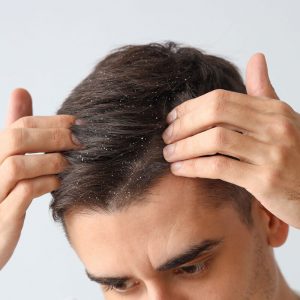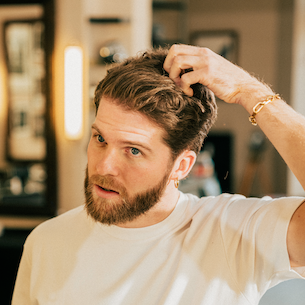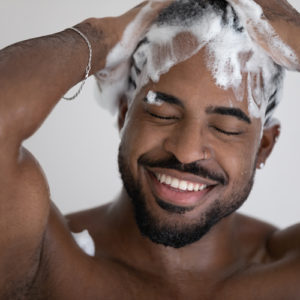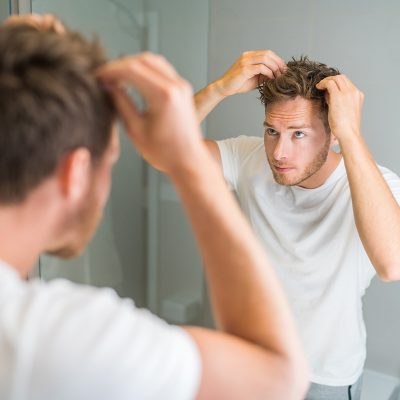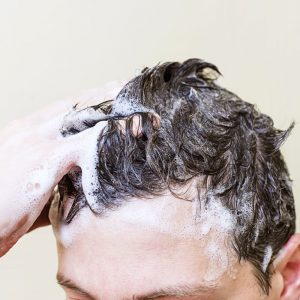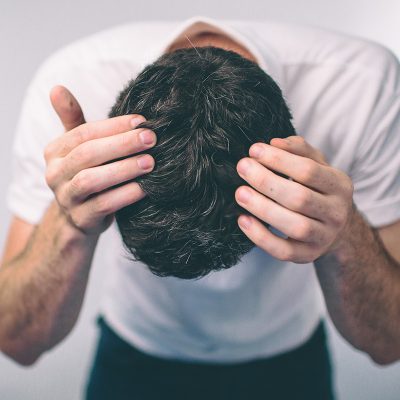Haarausfall bei Männer
Wie kann man Haarausfall bei Männern stoppen?
Ein paar Haare in der Bürste oder auf dem Kopfkissen sind ganz normal – doch was, wenn es plötzlich mehr werden? Wenn sich deine Geheimratsecken vertiefen, der Scheitel lichter wird oder dein Haar insgesamt ausdünnt? Haarausfall betrifft viele Männer, doch die gute Nachricht: Es gibt Lösungen! In diesem Artikel erfährst du, welche Ursachen hinter Haarausfall stecken, welche Behandlungsmöglichkeiten wirklich helfen und wie und womit du dein Haar langfristig stärken kannst.

Was ist Haarausfall und wann wird er zum Problem?
Haare zu verlieren ist ganz normal – doch ab wann wird tatsächlich von Haarausfall gesprochen? Mediziner unterscheiden zwischen einem natürlichen Haarwechsel und einem krankhaften Haarausfall (Alopezie). Während es völlig unbedenklich ist, täglich bis zu 100 Haare zu verlieren, kann ein übermäßiger oder ungleichmäßiger Haarverlust auf ein tieferliegendes Problem hinweisen.

Der Wachstumszyklus der Haare: Die 3 Phasen des Haarwachstums
Jedes Haar auf deinem Kopf durchläuft einen Lebenszyklus, der aus drei Phasen besteht:
1. Anagenphase (Wachstumsphase) - Rund 85 % der Haare befinden sich in dieser aktiven Wachstumsphase, die zwischen 2 und 6 Jahren dauert. In dieser Zeit wachsen die Haare etwa 1 bis 1,5 cm pro Monat.
2. Katagenphase (Übergangsphase) – Diese Phase dauert nur zwei bis drei Wochen, in denen das Haarwachstum stoppt und sich das Haar langsam von der Wurzel löst.
3. Telogenphase (Ruhephase & Haarausfall) – Etwa 10–15 % der Haare befinden sich in dieser Phase. Nach zwei bis vier Monaten fällt das alte Haar aus, während ein neues nachwächst.
Bei einem gesunden Haarzyklus folgt auf jedes ausgefallene Haar neues Wachstum. Doch bei vielen Männern gerät dieses Gleichgewicht aus der Bahn, sodass die Haare dünner werden oder ganz ausbleiben.

Wann beginnt der Haarausfall bei Männern?
Haarausfall kann bereits ab dem 20. Lebensjahr beginnen. Erste Anzeichen sind oft:
➔Geheimratsecken, die sich langsam vertiefen
➔Ein zurückgehender Haaransatz (hohe Stirn)
➔Immer dünner werdendes Haar am Oberkopf oder Scheitel
Bis zum 30. Lebensjahr bemerken bereits 25 % der Männer deutlichen Haarverlust. Mit 50 Jahren sind es sogar 50 %.
Warum sind so viele Männer von Haarausfall betroffen?
Die häufigste Form des Haarausfalls bei Männern ist der erblich bedingte Haarausfall (androgenetische Alopezie). Laut Studien betrifft er bis zu 80 % aller Männer im Laufe ihres Lebens. Der Grund? Ein Übermaß an Dihydrotestosteron (DHT), einem Abbauprodukt des männlichen Hormons Testosteron. Dieses Hormon lässt die Haarfollikel schrumpfen, wodurch die Haare dünner werden und schließlich nicht mehr nachwachsen.
Die 5 häufigsten Ursachen für Haarausfall bei Männern
Nicht jeder Haarverlust ist gleich – und nicht jeder ist endgültig!
1. Erblich bedingter Haarausfall: Der Hauptgrund für Haarverlust
Die häufigste Ursache für Haarausfall bei Männern ist die androgenetische Alopezie, also der erblich bedingte Haarausfall. Bei der androgenetischen Alopezie reagieren die Haarfollikel empfindlich auf das Hormon Dihydrotestosteron (DHT). Das führt dazu, dass die Haarwurzeln mit der Zeit schrumpfen, wodurch die Haare dünner und kürzer werden, bis sie schließlich nicht mehr nachwachsen. Dieser Prozess beginnt oft an den Geheimratsecken oder am Oberkopf und schreitet mit den Jahren fort.
2. Hormonelle Veränderungen: Wie DHT das Haarwachstum beeinflusst (h3)
Das Hormon DHT ist ein Abbauprodukt von Testosteron und spielt eine zentrale Rolle beim männlichen Haarausfall. Ein überschüssiger DHT-Spiegel sorgt dafür, dass die Wachstumsphase der Haare verkürzt wird. Doch nicht nur DHT ist ein Problem, auch andere hormonelle Schwankungen können Haarausfall auslösen, zum Beispiel:
➔Schilddrüsenerkrankungen (Über- oder Unterfunktion)
➔Hormonelle Überempfindlichkeit gegenüber Androgenen
➔Stoffwechselstörungen oder Nährstoffmängel, die das Haarwachstum stören
➔Autoimmunerkrankungen, z.B. Alopecia Areata (kreisrunder Haarausfall)
➔Medikamente wie Blutdrucksenker oder Antidepressiva
3. Ernährung & Lebensstil begünstigen Haarausfall
Eine unausgewogene Ernährung kann sich direkt auf dein Haarwachstum auswirken. Besonders ein Mangel an Eisen, Zink, Vitamin D, Vitamin B12 und Biotin wird oft mit Haarausfall in Verbindung gebracht. Doch auch Rauchen, übermäßiger Alkohol- oder Koffeinkonsum und zu wenig Bewegung können die Durchblutung der Kopfhaut verschlechtern und Haarausfall begünstigen.
4. Stress & psychische Belastung
Dauerstress ist nicht nur schlecht für deine Nerven, sondern auch für dein Haar. Chronischer Stress sorgt für eine verstärkte Ausschüttung des Hormons Cortisol, das das Haarwachstum hemmen kann. Zudem führt Stress oft zu Verspannungen in der Kopfhaut, wodurch die Durchblutung schlechter wird – und weniger Nährstoffe an die Haarwurzeln gelangen.
5. Kopfhautgesundheit & falsche Haarpflege
Die richtige Haarpflege kann einen großen Unterschied machen. Aggressive Shampoos oder tägliches Haarewaschen können die Kopfhaut austrocknen und die Haarwurzeln schwächen. Auch Schuppen und Entzündungen können Haarfollikel verstopfen oder zu Haarausfall führen. Zudem kann eine schlechte Durchblutung der Kopfhaut dazu führen, dass die Haarwurzeln nicht mehr ausreichend mit Nährstoffen versorgt werden.
Haarausfall stoppen & Haarwachstum beschleunigen: Was können Männer gegen Haarausfall tun?
Good News: Haarausfall ist nicht immer endgültig!
Ob der Haarausfall gestoppt werden kann, hängt von der Ursache ab. Erblich bedingter Haarausfall kann zwar verlangsamt, aber nicht rückgängig gemacht werden – einmal verlorene Haare wachsen nicht von selbst nach. Diffuser oder temporärer Haarausfall, verursacht durch Stress, Nährstoffmangel oder Krankheiten, lässt sich dagegen oft vollständig umkehren, wenn die Ursache behandelt wird.Viele Produkte versprechen schnelleres Haarwachstum, doch der natürliche Zyklus lässt sich nur begrenzt beeinflussen. Dennoch können Ernährung, Wirkstoffe, Kopfhautpflege und medizinische Behandlungen den Haarausfall stoppen und das Haarwachstum unterstützen. Von Shampoos und Haarwuchsmitteln über Kopfhautmassagen bis hin zur Haartransplantation – wir zeigen dir, welche Methoden wirklich helfen, um dein Haar langfristig zu stärken und Haarausfall in den Griff zu bekommen!
1. Shampoos gegen Haarausfall mit Koffein & Biotin
Spezielle Anti-Haarausfall-Shampoos können eine unterstützende Rolle spielen. Inhaltsstoffe wie Koffein, Biotin und Niacinamid sollen das Haarwachstum stimulieren, die Kopfhaut durchbluten und die Haarwurzeln stärken.
Beachte: Shampoos allein reichen nicht aus, um genetischen Haarausfall zu stoppen, können aber helfen, die Haare kräftiger und gesünder zu halten.
Unser Activator Hair Shampoo für dünner werdendes Haar stärkt die Haarwurzeln und fördert das natürliche Wachstum. Die innovative Formel mit Coffein, Capilia Longa™ und einem Vitamin-Komplex sorgt täglich für kräftigeres, dichteres Haar.
Unser Activator Hair Tonic ist die perfekte Ergänzung zum Activator Hair Shampoo. Die Formel mit Koffein, Capilia™ Longa und einem Vitamin-Komplex fördert das Haarwachstum, kräftigt die Wurzeln und sorgt für sichtbar dichteres, gesünderes Haar – die ideale tägliche Pflege für mehr Fülle und Stärke.
Unser Activator Hair Tonic ist die perfekte Ergänzung zum Activator Hair Shampoo. Die Formel mit Koffein, Capilia™ Longa und einem Vitamin-Komplex fördert das Haarwachstum, kräftigt die Wurzeln und sorgt für sichtbar dichteres, gesünderes Haar – die ideale tägliche Pflege für mehr Fülle und Stärke.
2. Haarwuchsmittel für Männer – Minoxidil, Finasterid und Co.
Es gibt verschiedene verschreibungspflichtige und rezeptfreie Medikamente, die den Haarausfall verlangsamen oder stoppen können:
Minoxidil regt die Blut- und Nährstoffversorgung der Haare an, stärkt dein Haar und fördert dadurch das Wachstum neuer Haare. Dadurch kommt zwar kein bereits verlorenes Haar zurück, jedoch kann das Fortschreiten des Haarverlustes gestoppt oder verlangsamt werden. Auch, wenn du Minoxidil rezeptfrei in jeder Apotheke bekommst, solltest du vorher abklären, ob dies für dich die richtige Vorgehensweise ist.
Finasterid hemmt das Enzym 5-alpha-Reduktase. Dieses Enzym reagiert nämlich mit Testosteron und dabei entsteht Dihydrotestosteron, was für androgenetische Alopezie verantwortlich ist. Wird das Enzym gehemmt, entsteht weniger DHT, was wiederum den Haarausfall verlangsamt. Da Finasterid in deinen Hormonhaushalt eingreift, ist es verschreibungspflichtig.

3. Hausmittel gegen Haarausfall: Kopfhautmassage mit Aloe Vera & Kokosöl
Neben medizinischen Mitteln gibt es auch einige natürliche Alternativen. Eine regelmäßige Kopfmassage kann die Durchblutung der Kopfhaut verbessern und das Haarwachstum anregen, gerade in Verbindung mit Aloe Vera oder Kokosöl. Aloe Vera enthält nämlich Enzyme und Kokosöl bestimmte Fettsäuren, die das Haarwachstum fördern können.
How to: Lasse das Öl oder Aloe Vera Gel auf der Kopfhaut nach der Kopfmassage etwas einwirken, und wasche es dann mit warmem Wasser und einem milden Shampoo aus. Solltest du mal weniger Zeit haben, kannst du deine Kopfhaut auch während des Shampoonierens massieren. Eine sorgfältige und natürliche Pflege deiner Kopfhaut ist die Voraussetzung für guten Haarwuchs.
Beachte: Hausmittel wirken oft langsamer und sind nicht bei jedem gleich effektiv – aber sie können eine gute Ergänzung zur Haarpflege sein.
4. Ernährung für gesundes Haar
Eine ausgewogene Ernährung kann Haarausfall vorbeugen und dein Haarwachstum unterstützen.
➔Eisen und Zink fördern die Haarwurzeln und verhindern brüchiges Haar.
➔Biotin und Vitamin B12 stärken das Haarwachstum und verhindern Haarausfall.
➔Vitamin B3 und Omega-3-Fettsäuren fördern die Durchblutung der Kopfhaut
➔Vitamin C & D unterstützen die Nährstoffaufnahme und stärken das Immunsystem.
➔Vitamin B3 fördert die Durchblutung der Kopfhaut, wodurch die Haarwurzeln besser mit Sauerstoff und Nährstoffen versorgt werden.
➔Vitamin B6 unterstützt den Proteinstoffwechsel und die Keratinproduktion, die unerlässlich für das Haarwachstum ist.
Das heißt: Viel Gemüse, Fisch und Obst essen. Auch Nahrungsergänzungsmittel können dich hierbei unterstützen.
5. Haartransplantation – Die letzte Lösung?
Wenn der Haarausfall bereits weit fortgeschritten ist, kann eine Haartransplantation eine dauerhafte Lösung sein. Dabei werden gesunde Haarfollikel (meist aus dem Hinterkopf) in kahle Stellen verpflanzt. Die Erfolgsquote ist hoch, doch die Behandlung ist kostspielig und erfordert eine gewisse Heilungszeit. Alternativ gibt es auch Low-Level-Lasertherapie (LLLT), die das Haarwachstum mit Lichtwellen stimulieren soll – die wissenschaftliche Evidenz dazu ist jedoch noch begrenzt.
Welche Methode die beste für dich ist, hängt von der Ursache und dem Fortschritt deines Haarverlusts ab. Du solltest auf jeden Fall vorab mit einem Arzt über dein Vorgehen sprechen.
Und vergiss nicht: Eine Glatze kann auch ein Statement sein! Schließlich hast du immer noch deinen Bart zum Stylen.
Volles Haar mit der richtigen Wirkstoff-Kombination
Während neue Haare nicht über Nacht sprießen, kann eine gezielte Haarpflege das Haar kräftiger, widerstandsfähiger und gesünder machen.
Arten von Haarausfall bei Männern
Haarausfall ist nicht gleich Haarausfall. Um die richtige Behandlung und Mittel zu finden, solltest du sichergehen, unter was für einem Haarausfall du genau leidest und dadurch mögliche Ursachen eingrenzen. Wir gehen einmal auf die drei häufigsten Arten ein, sodass du dir schonmal einen guten Überblick verschaffen kannst:
#1: Erblich bedingter Haarausfall (androgenetische Alopezie):
Erblich bedingter Haarausfall ist die häufigste Form von Haarausfall bei Männern – es betrifft etwa 70-80% der Männer im Laufe ihres Lebens. Die ersten Anzeichen sind oft Geheimratsecken und ein zurückweichender Haaransatz. Mit der Zeit kann sich der Haarausfall auf den gesamten Kopf ausweiten und schließlich zur Glatze führen. Erblich bedingter Haarausfall wird durch eine Überempfindlichkeit der Haarfollikel auf das Hormon Dihydrotestosteron (DHT) verursacht. Das Hormon DHT verursacht eine Verkürzung der Wachstumsphase der Haare, was dazu führt, dass die Haare dünner und schwächer werden, bis sie schließlich ausfallen.

#2: Diffuser Haarausfall (diffuse Alopezie):
Bei einem diffusen Haarausfall wird dein Haar allmählich über den gesamten Kopf verteilt dünner. Gleichzeitig werden deine Haare brüchiger und verlieren an Glanz. Es gibt viele verschiedene Ursachen für einen diffusen Haarausfall. Eine der häufigsten Gründe sind hormonelle Veränderungen, wie Schilddrüsenprobleme oder auch starker Stress. Eine gute Ernährung, die ausreichend Vitamine und Mineralstoffe enthält, ist nicht nur für ein gesundes Haarwachstum wichtig. Demnach schadet es nicht, hier verstärkt darauf zu achten. Auch bestimmte Medikamente und Unverträglichkeiten können zu Haarausfall führen.

#3: Kreisrunder Haarausfall (Alopecia areata):
Wie der Name schon andeutet, charakterisiert sich dieser Haarausfall durch vereinzelte, runde, kahle Stellen am Kopf. Ein möglicher Grund hierfür kann eine Autoimmunerkrankung sein, bei der das Immunsystem des Körpers irrtümlicherweise die Haarfollikel angreift und sie zerstört. Die genauen Ursachen für diese Krankheit sind noch nicht vollständig erklärbar, es wird jedoch vermutet, dass es eine Kombination aus genetischen und Umweltfaktoren ist.

FAQ
Wie viel Haarausfall ist normal?
Ab wann spricht man eigentlich von Haarausfall? Ein gewisser Haarverlust ist Teil des natürlichen Haarzyklus und kann durch verschiedene Faktoren wie Stress, Hormonschwankungen oder die Verwendung von bestimmten Haarprodukten beeinflusst werden. Es ist also durchaus normal, dass das Haar mit zunehmendem Alter etwas dünner wird und manche Haarwurzeln keine neuen Haare mehr produzieren.Bemerkst du jedoch einen übermäßigen Haarausfall, wie beispielsweise ein deutliches Ausdünnen deiner Haare oder sogar kahlen Stellen auf der Kopfhaut, solltest du mögliche Ursachen beachten. Neben einer erblichen Veranlagung können Hormonstörungen, Autoimmunerkrankungen oder auch bestimmte Medikamente sowie eine schlechte Ernährung Grund dafür sein.Bei starkem Haarausfall raten wir dir, zuerst einen Arzt oder eine Ärztin aufzusuchen, um sicherzugehen, dass beispielsweise keine Autoimmunkrankheit oder Pilzinfektion vorliegt und du deine Medikamente gut verträgst. Sobald du den Grund deines Haarausfalls kennst, kannst du deinen Haarausfall stoppen oder immerhin verlangsamen.
Wann sollten Männer mit Haarausfall einen Arzt aufsuchen?
Solltest du sehr jung sein und Haarausfall bemerken, Haarausfall in einem ungewöhnlichen Muster, wie z.B. kreisrunden Haarausfall, Schmerzen, Juckreiz oder Rötung auf der Kopfhaut oder in Verbindung mit anderen Symptomen, wie z.B. Gewichtsverlust, Müdigkeit oder Veränderungen im Hautbild feststellen, solltest du unbedingt einen Arzt oder deine Ärztin aufsuchen! Aber auch, sobald du einen verstärkten Haarausfall über mehrere Tage oder kahle Stellen bemerkst, suche bitte deinen Arzt oder deine Ärztin auf, um schwerwiegende Ursachen für deinen Haarausfall im besten Fall auszuschließen. Außerdem kannst du somit besser etwas dagegen unternehmen.
In welchem Alter verlieren Männer ihre Haare?
Bei manchen Männern beginnt der Haarausfall bereits mit Ende 20, und betrifft ab dann immer mehr. Ungefähr die Hälfte aller Männer hat mit 50 Jahren eine Halbglatze oder Glatze.
Können Männer einem Haarausfall vorbeugen?
Generell helfen mehr Ruhe, eine ausgewogene Ernährung und eventuell gezielte Nahrungsergänzungsmittel. Und die ein oder andere Kopfmassage schadet auch nicht.
Sharing is caring!
Leidest du unter Haarausfall? Teile gerne deine Tipps mit uns.
Wir freuen uns, von dir auf Instagram oder Facebook zu hören.
Entdecke weitere Haarpflege-Tipps in unserer Academy
Related product

Activator Hair Bundle
€ $82.00
€ $76.00
